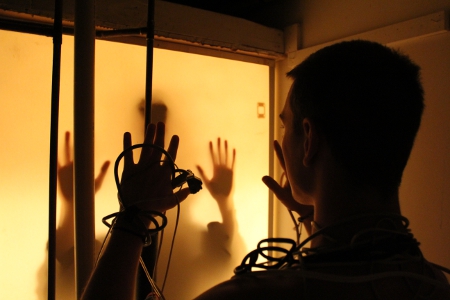FRINGE SHORTS: “The Love Song of J. Alfred Prufrock”
Lightsey Darst offers a perceptive, fantastically witty review of a show she says "truly reeks of college dorm room." She's got some bracing criticism for the players, for sure, but delivers it with both style and a fair amount of affection.


I ARRIVED AT THE LOVE-SONG OF J. ALFRED PRUFROCK at 10 o'clock at night, three Fringe shows to the wind, with a blaring headache, starved, traumatized from my own maniac driving (I'm still ashamed — sorta, not really — of the move I pulled to get a parking space at one venue), head full of half-sentences of critical gabflab, worn out with appreciating, utterly exhausted, in short.
If you can recreate these conditions, then I recommend seeing Prufrock.
This was my experience: I got to Theater in the Round, which, being circular, is confusing. Hardly anyone was there, and the lighting in the theater had a dusty, dismal cast, such that I felt I'd entered a semi-private circle of hell. Meanwhile, Prufrock, the entirely too charming Tyler Stuckey (who clearly has not seen that his head has grown slightly bald), set up his own even more exclusive circle of video monitors, mumbling to himself. "I've already accepted that what I'm about to do won't do a thing for any of you," he said. And you know, in my addled state, I thought that was promising. An anti-Fringe show! Down with entertainment! Damn straight! And I settled into the role of a spectator at an anti-entertainment, at once uncooperative and entranced.
In this state, the highly allusive text (the work of David James Peterjohn and Sean Fleming) rolled right over me the way too-clever student papers sometimes do. I did pause to notice what struck me as the bad taste of including Ralph Ellison in this meditation on middle-ruling class problems, but otherwise, Eliot, Ecclesiastes, J. M. Barrie, the Tao — it all rose to the rafters in a smog. "Words, words, words," I mumbled along with Hamlet (who's in the soup too).
Mostly, I watched the video (Fleming's work). I could see two screens: one a dreamy cycle of green and water, girls in white dresses, a woman finding her way through a woods with a bow in her hand, and the other an addictive speeding reel of news, ads, bumping booties, faces, teeth, color, light, click clickclickclick. When Stuckey went to embrace a monitor and it went dark, I felt personally sad, like an addict who sees his bottle broken.
I gave up trying to track how this interpretation of the T. S. Eliot poem matches my interpretation — because who really cares? I was more than once reminded of the used anthology in which I first read Prufrock, in which, beside the lines "I should have been a pair of ragged claws / Scuttling across the floors of silent seas," someone had written (in a slanting, ill-planned hand), "WISHES HE WERE A CRAB." Not that Peterjohn and Fleming are like this literal clod, but any interpretation that does not chime with our own will strike us as unfeeling, dense — and you know, this is a Prufrockian sort of tragedy itself, isn't it, the impossibility of anyone else's feeling it just the way you do? "In the room the women come and go / Talking of Michelangelo"…
Similarly Prufrockian are the monologue's missed opportunities. When Stuckey did an angry little dance to a rap with lots of f-words, I recoiled because I couldn't help thinking about how much violence in the world today is caused by young men who feel they will not be able to breed. Prufrock's malaise is today's melee, but Peterjohn and Co. don't go into that — but it's in the spirit of the original to duck the hard stuff, isn't it?
Bear with me while I take this through a final twist. In a more sober mood, I might have proceeded on to a conclusion about the youth of everyone involved (because this show truly does reek of college dorm room) — something along the lines of "These bright young people will surely do something worthwhile in the future," etc; I might have noted that, although Stuckey pulls out all the actorly tricks (the sudden change in volume, the dramatic tilt of the head), I still don't believe he's felt these emotions he's talking about. But then I couldn't help remembering that the original "Prufrock" is also the work of an overeducated young man who did not really know what he was talking about. And in my haze, it struck me that this is the ultimate joke of Prufrock: to have one's least favorite emotions parroted by callow twenty-somethings who still have the world ahead of them, who don't know what it is to sometimes wish that one might become something else, like, for example, a crab.
______________________________________________________
Related performance details:
The Love Song of J. Alfred Prufrock by Peterjohn Productions is on stage at Theater in the Round Players in Minneapolis. Shows are: Wednesday 8/10 (7 pm); Saturday 8/13 (5:30 pm).
Check back regularly throughout the Fringe Festival for more short reviews on mnartists.org, sent in from our intrepid performance critics on the scene
______________________________________________________
About the author: Originally from Tallahassee, Lightsey Darst is a poet, dance writer, and adjunct instructor at various Twin Cities colleges. Her manuscript Find the Girl was recently published by Coffee House; she has also been awarded a 2007 NEA Fellowship. She hosts the writing salon, "The Works."